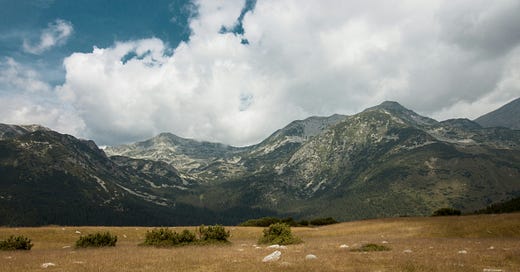I’m behind two posts due to traveling, and have noticed that several people have unsubscribed. Please bear with me.
From the airport in Bucharest, we set out on the 6-hour drive along the winding roads towards Transylvania. The minivan doesn’t have seat belts. And the driver takes offense that I’m searching for one. That will be a recurring theme this week.
The sun sets before we reach the mountains. There are three men from Turkey in the row of seats behind me. They’re having an animated conversation in their mother tongue about something that keeps switching gears from playful to contentious. In front of me are three Romanians. The woman in the middle is speaking non-stop. Her voice is a strange aria. Romanian is a quick and seamless rise and fall in my ear.
Memories seep slowly into my consciousness. Lying in the backseat of a car—in those days before seat belts were the law—staring out the window at the stars in the black sky, and listening to my mother and my stepfather—to their voices only, not bothering to work out words, or even tone. Utterly uninvested, but enveloped by the mysterious business of grown-ups.
For dinner I eat polenta, which I haven’t had since I was a kid—when my mother would slice it, fry it and then pour maple syrup over it. This polenta was grilled, and served with ham hocks. It’s strange that so far from my childhood home, expecting strange foods, I get a bit of nostalgia.
The next day we visit schools, where the children sing for us. They’re wearing variations of the national costume. One blond child makes it her own with pink boots laced with pink ribbons tipped with pompoms. Another, older girl, has a sequined skirt under the traditional apron. Every song seems to have 20 verses. I’m impressed.
I’m pretty sure The Erie Canal song only had two.
They do short plays about the history of Romania. Redacted for us, I think. They recite information about their folk arts. And they dance for us. These wonderful, flowing circle dances, with asymmetrical pairings, which I think make them all the more beautiful. For just over 90 minutes, we sit on the benches, watching the children. Today, I’m so tired my ears are full of white noise and the echoes of the folk music. When I close my eyes I see the boy playing the silver tuba, tapping the blue tambourine against it with his spare hand.
After all the dancing and music yesterday, we watched a presentation by one of the students about their work with robotics—an EU project for teens that aims to put a robot into orbit around one of Mars’ moons. Then my colleague guided the students through a role-play about industry and ecology. This is why we are here. Why my colleague is here, and I’m tagging along.
But the students aren’t concerned about hypothetical pollution in the river here, they dream that this former Soviet coal mine valley will become Romania’s answer to Silicon Valley. Still, the students talked about preserving their “traditions” a couple of times. These young people are proud. And as we drove through and above the valley this afternoon, I wondered what it will look like in 20 years. In 50. What will happen to these small brick houses, most of which are crumbling. What about the picturesque haystacks, and the stray dogs? Will the people be able to raise the standard of living without attracting a McDonalds?
There’s a billboard near the cave we visit, praising Erwin Rommel, the desert fox. It’s eerie. There are things we don’t talk about with our hosts. I’m reminded of what it was like working with International PEN, when it would have been helpful to have a checklist of what was safe conversation with each nationality—or ethnic group.
One of our hosts points to the ornate houses lining the road and tells us they are Gypsy houses. In Norway we say Roma out of respect. It’s these differences that can lead to misunderstandings and assumptions. I’m assuming our host knows more than I do about the names in the local languages, and that the old translation was Gypsy, and that there’s no tension between the peoples.
But another of our hosts keeps telling people that I’m “really” an American. It’s strange perhaps that I’m so offended that she’s taking control of my narrative. Maybe I’m especially sensitive since memories of my childhood seem to be coming more often and more vividly now, and I want to put a wall between who I am now and those years when I had no agency.
All the years that I traveled often were a way for me to figure out who I am. Not in a linear way, and not in a pretty way—but eventually. Strip away the trappings of your national identity, of your habits, and your preferences for food and drink and music, and you feel naked and new. You eat trout with capers and tangerines and wonder what on earth you really ever liked best to eat.
Thank you for taking the time to read.
I’d love to hear your thoughts—please share them in the comments on Substack, or go to the Dramatic Roots chat, where note sharing can be an act of literary citizenship. Post a link to your work, and share another. I will share yours. You can find more about my work, including my mentoring and accountability services, at renpowell.com.
I’ll be back next week with a new poem.
Warmly,
Ren
Spread the love. It only takes a little ❤️ And if you like me, you really like me:
If you’re not ready to commit to a subscription, or have reservations about substack, I’m always happy to accept A CUP OF COFFEE ☕.
Photo by Wojciech Rzepka on Unsplash





Beautiful and vivid rendering of that strange experience of sensing places within places and times within time. I love this.